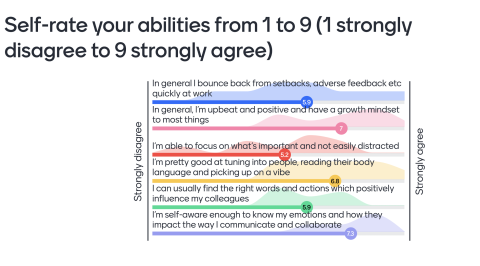
Focus and effectiveness at work
This newsletter includes some great resources , talks and podcasts on how to improve attention at work.
On our training programs we hear the same thing again and again.
- “I can’t focus properly anymore.”
- “People interrupt me, and I get distracted.”
- “My days are filled up with back-to-back meetings.”
- “I don’t have time to focus on what’s important.”
- “There’s no time for creativity.”
- “I’ve lost the ability to read to the end of a page without getting distracted.”
On one of these programs I asked the team to self-rate their abilities using Richard Davidson’s emotional style model. The ability to focus was the lowest score.
And yet few workplace training programs include attention training. As the godfather of American psychology, William James noted:
“The faculty of bringing back a wandering attention over and over again is the very root of judgment, character and will.”
“An education which should improve this faculty would be the education par excellence” William James 1890
Without presence it’s hard to develop and deploy our emotional abilities at work. And it’s hard to step back and take a moment to reflect on some of our biases and autopilot behaviours which impact wellbeing, collaboration and effectiveness.
Here are some useful resources for improving focus at work.
Books
“Focus – the hidden driver of excellence” by Dan Goleman
This book is an excellent read for any leader or emerging leader who feels swamped with data and unsure how to prioritise tasks.
Goleman is one of the people who made emotional intelligence popular. He built on the foundations of academics, including Mayer, Salovey and Caruso. Their research and applications in workplace settings pointed to emotional intelligence being a series of different, developable abilities.
And with many, if not all of these abilities, there is a clear research link between practising various mindfulness techniques and developing these abilities. For example, the ability to regulate emotions to express things coherently and in a contextually sensitive manner.
In this book, Goleman explores a model of four things that a leader needs to focus on. He also explains the brain science of why these four things sometimes complement each other and sometimes compete. For example, one of the areas we need to focus on is attention to detail: we need to make sure that we are focused on safety, completing a job, working through our tasks and extracting value from the systems we have in place right now. For many people, this is a comfortable place. It’s a place where we tick boxes and strike a line through things on our to-do list. Unfortunately, however, this is a zone of potential intoxication.
Each time we tick something off our to-do list, we get a little hit of dopamine, which feels good. Dopamine feels good and is a signaller of a future reward – which means we become ever more engrossed in our tasks, potentially at the expense of seeing different ways of doing things and checking our task alignment with our colleagues and organisation. It also means we narrow our focus into detail at the expense of blue sky creative thinking.
The four areas in his model are:
- Extracting value and follow-through (as above)
- Exploring new opportunities, threats, regulatory frameworks
- Connecting with the team – passionate, energetic, listening, collaborating
- Self-awareness and self-care – tuning into our energy levels and understanding the impact of our own physical and mental wellbeing and our ability to learn, communicate, collaborate and lead
He discusses how we need to maintain a balanced portfolio of attention between each of these areas.
Peak Mind by Dr Amishi Jha
I’ve watched Dr Jha’s TED Talk so many times. Every year I show it to our medical students. That short TED is a powerful business case for learning to train our attention and embed mindfulness techniques into our home and work lives.
If your job requires that you:
- absorb and store information;
- come up with novel and creative solutions;
- sustain your attention for long periods;
- shift your attention seamlessly from one task to the next; and
- sift through information and distil what’s important
Then developing mindfulness practises will help you be more effective in your role.
The organized mind by Daniel Levitin
This a great book by neuroscientist Daniel Levitin. Written before the pandemic, it’s never been more relevant to consider the impact of data overload, how we store that data and how we can train our attention.
Offline by Imran Rashid and Soren Kenner
This is a great book explaining coherently how big tech hacks into our brain/mind/body/community connections to bring our eyes to a screen, manipulate your choices and ultimately extract value by doing this.
They provide excellent examples of how to curb tech addiction and create healthy screentime.
Podcasts
Ezra Klein interviews Johann Harri about his recent book “Stolen Focus”
The importance of attention - for wellbeing and at work
In this TED Talk neuroscientist Amishi Jha introduces her research. She illustrates how practicing mindfulness techniques not only reduces stress but helps us pick up vital information at critical moments, such as on battlefields, in hospitals and other emergency situations. It illustrates how much we might be missing at home and at work. Mindfulness helps people be more situationally aware, safer and be able to observe, store and recall information more accurately.
Mindset coaching
To find out more about mindset coaching with Andy Roberts, contact us today.



